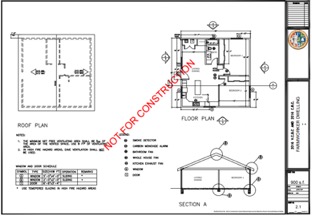Accessory Dwelling Unit Ordinance Update
In 2018, the Ventura County Board of Supervisors and California Coastal Commission approved amendments to both the Non-Coastal and Coastal Zoning Ordinances for Accessory Dwelling Units (ADU) in unincorporated Ventura County. Accessory Dwelling Unit replaced “Second Dwelling Unit” within the ordinances in order to apply a broader range of development standards in both zoning ordinances. The term was redefined as part of a larger comprehensive Accessory Dwelling Unit update to both zoning ordinances to be consistent with state law.
From 2018 through 2022, the state legislature has updated regulations for Accessory Dwelling Units (ADUs) and Junior Accessory Dwelling Units (JADUs) annually, with the intended purpose of easing local zoning controls, reducing associated development fees, and streamlining the permit process. The updated legislation expressly limits a local agency’s ability to regulate ADUs and JADUs. More information about the recent state-wide changes to ADUs, including the State’s ADU Handbook (most recently updated in July 2022), can be found on the California Department of Housing and Community Development’s (HCD) webpage.
Most recently, staff conducted an update to the ADU regulations in the Non-Coastal Zoning Ordinance (NCZO) to comply with state regulations, which was adopted unanimously by the Board of Supervisors on February 7, 2023. and were effective on March 9, 2023 (See agenda, documents, and recording of the hearing at this link. This adopted ordinance identified the available permitting pathways for ADUs and JADUs, as well as requirements for parcels in non-coastal areas. Detailed information regarding these adopted ADU/JADU provisions is available on the Accessory Dwelling Unit Permits page.
Thereafter, the adopted ADU ordinance applicable to the non-coastal areas was submitted to HCD for its review, as required by state law. HCD requested certain revisions consistent with state law, which were discussed with Planning Division staff in late 2023. Based on this discussion, staff drafted a proposed ordinance amending Section 8107-1.7 of the Non-Coastal Zoning Ordinance which include the following:
- Revisions recommended by HCD to the regulations that apply to ADUs and JADUs that require approval of only a building permit in residential and mixed-use zones (Building Permit ADUs and JADUs);
- Revisions to address new State law provisions (AB 976 and AB 1033) effective January 1, 2024, and urgency legislation (AB 477) effective March 25, 2024; and
- Revisions recommended by staff to clarify and facilitate consistent implementation of the new ADU regulations.
Information on the public hearings for this proposed ordinance amendment is provided below.
After the ordinance is adopted by the Board of Supervisors, and thereafter certified b HCD, Planning Division staff will be updating ADU and JADU regulations consistent with state law requirements in the Coastal Zoning Ordinance. Until that time, all coastal ADU permit applications will be reviewed using both the County’s existing development standards pursuant to Coastal Zoning Ordinance Section 8175-5.1.1 (available here) and, where applicable, the State’s revised development standards to verify consistency with state law. Please check back this webpage for the anticipated timeframe regarding this project.
Public Hearings for NCZO update
Board of Supervisors – June 4, 2024, 1:00 pm
On June 4, 2024, the County of Ventura’s Board of Supervisors is scheduled to consider adoption of the Proposed Ordinance amending Article 7 of the Ventura County Non-Coastal Zoning Ordinance, pertaining to Accessory Dwelling Units (ADUs) and Junior Accessory Dwelling Units (JADUs), and the related CEQA exemption. The agenda, documents, and recording of the hearing can be accessed at this link.
Planning Commission – April 4, 2024
On April 4, 2024, the County of Ventura’s Planning Commission recommended approval of county-initiated amendments to Articles 7 of the Ventura County Non-Coastal Zoning Ordinance pertaining to Accessory Dwelling Units (ADUs) and Junior Accessory Dwelling Units (JADUs), and the related CEQA exemption to the Ventura County Board of Supervisors. The agenda and documents for Planning Commission hearing can be accessed on the County of Ventura’s website at this link.
What if I am ready now to permit my accessory dwelling unit?
We are here to help! If you have questions about how to permit your accessory dwelling unit but need guidance, please visit our Accessory Dwelling Unit Permits page or contact us at 805-654-2488. Our staff can assist with navigating the new ordinance.
Additionally, the Building and Safety Division has available for public use, pre-approved standardized ADU plans on their website HERE. These standardized plans are free of charge and provide County residents the option to build an ADU or Farmworker Dwelling Units on their property using standardized design by reducing the cost or time that is typically needed for reviewing a new design.
Questions?
For questions regarding the Accessory Dwelling Unit Ordinance update for the non-coastal and coastal zones, please contact Ruchita Kadakia, Planning Manager, at ruchita.kadakia@ventura.org, or by calling 805-654-2414.
Contact Us
Ruchita Kadakia
(805) 654-2414
Ruchita.Kadakia@ventura.org



